2020中考英语语法专项复习:代词
图片预览
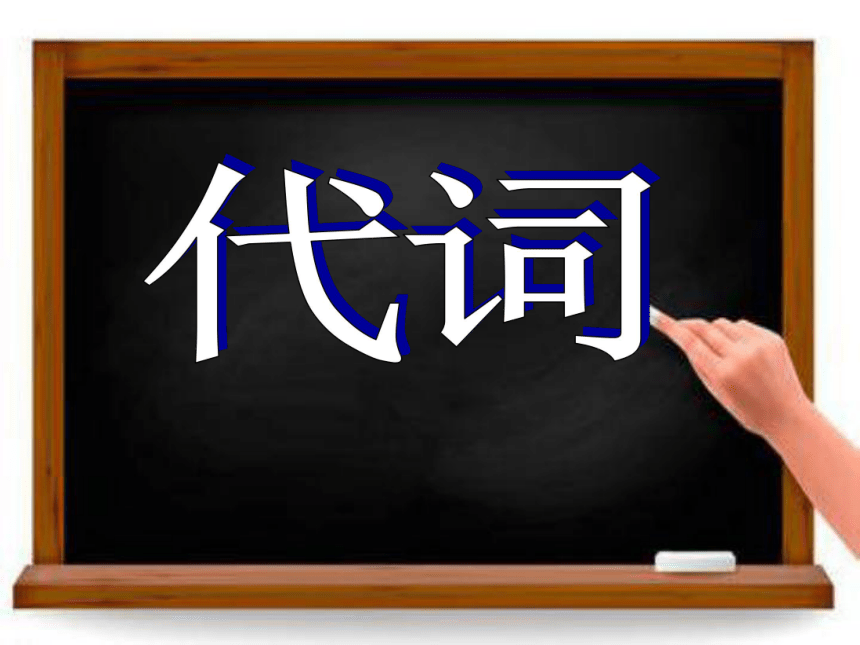
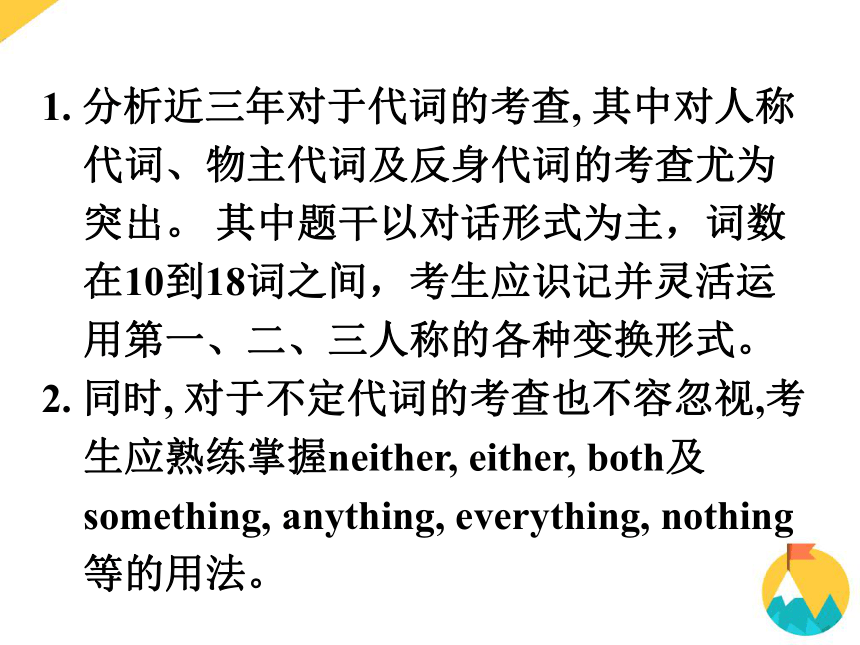
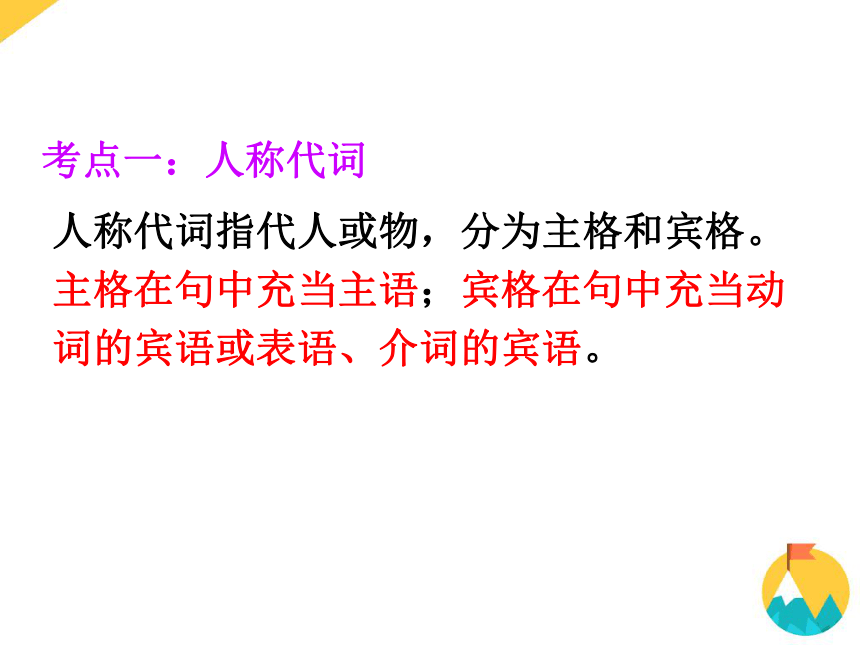
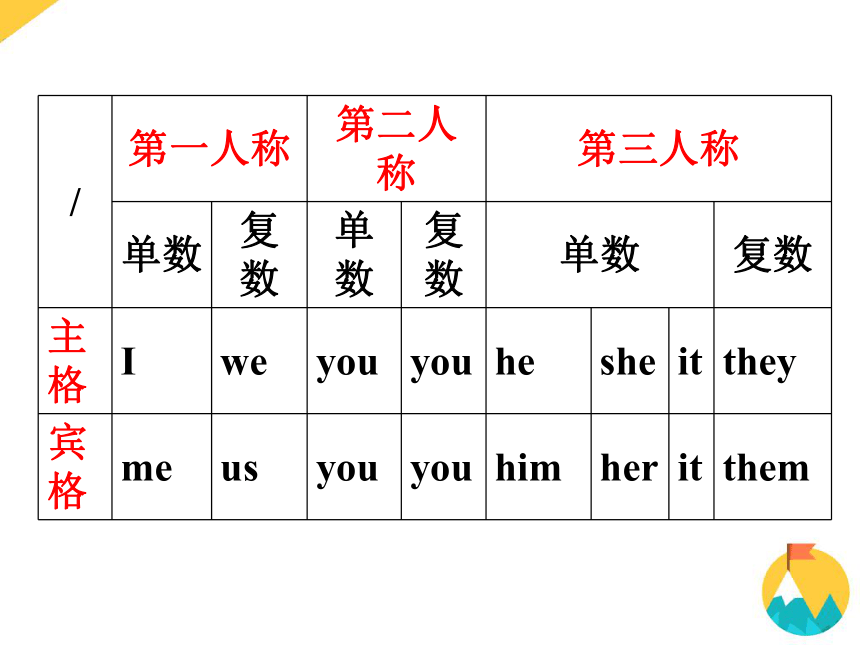
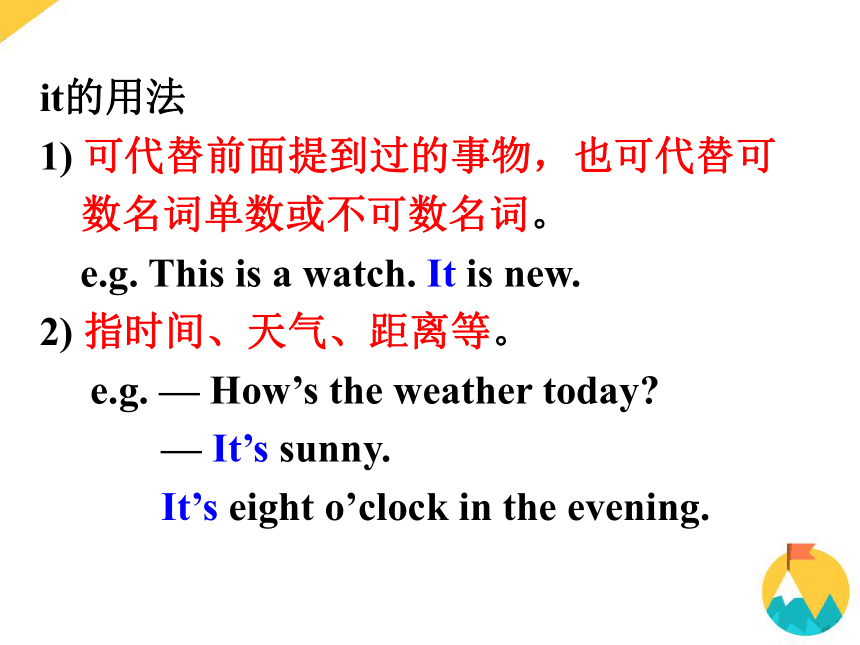
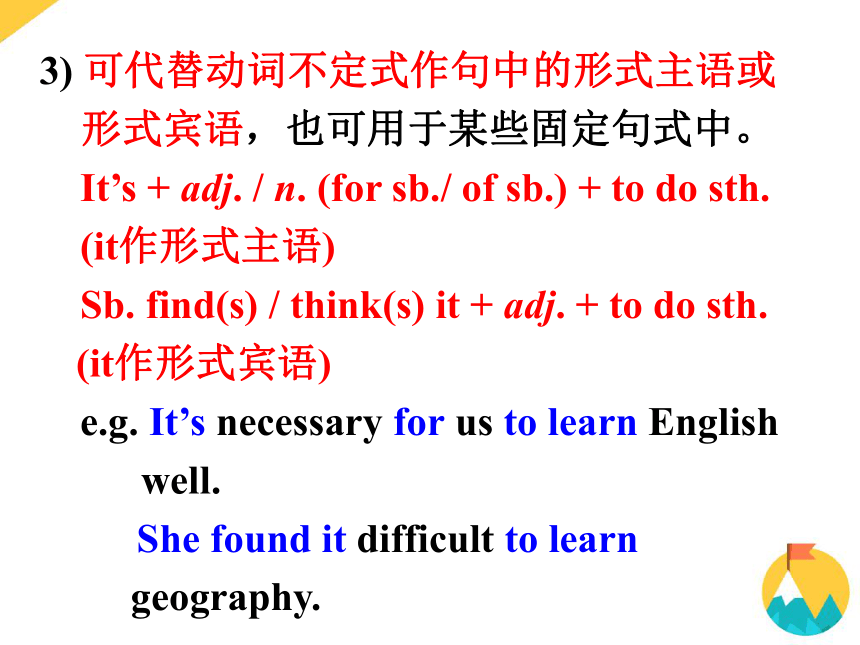
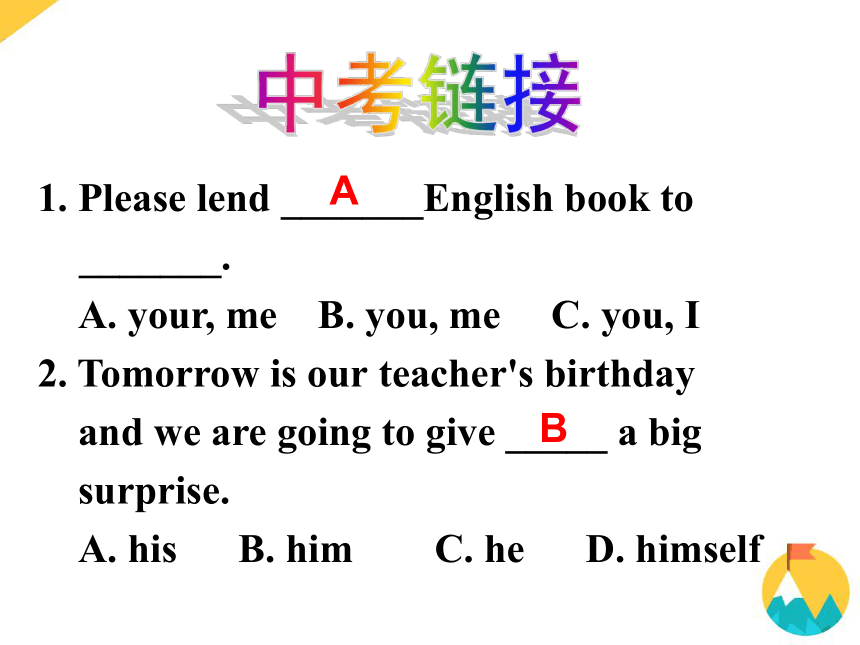
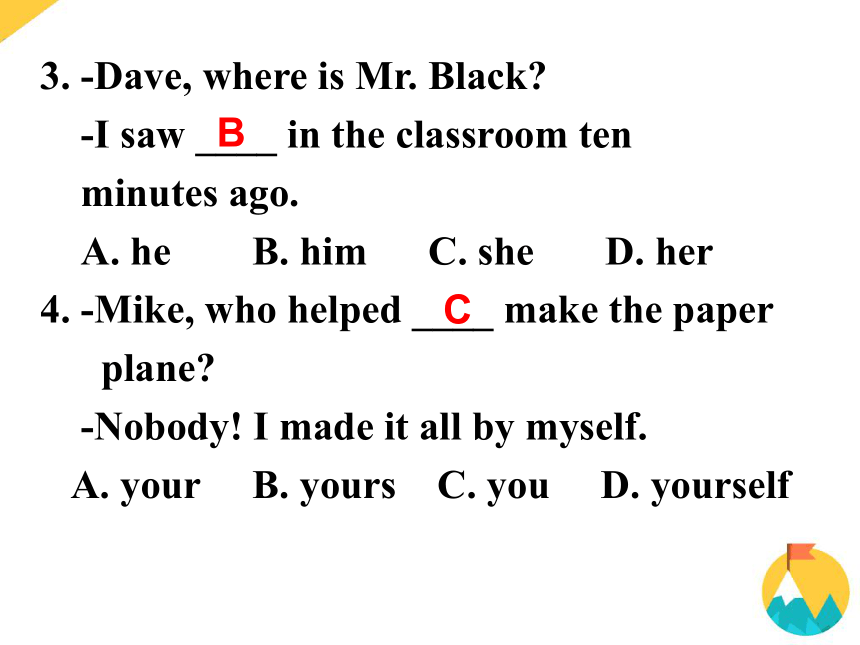
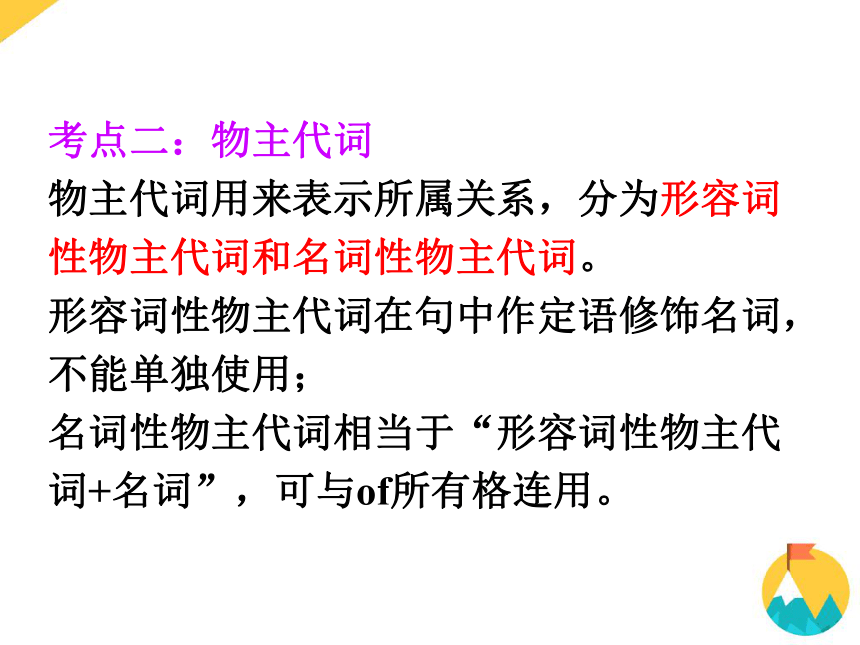
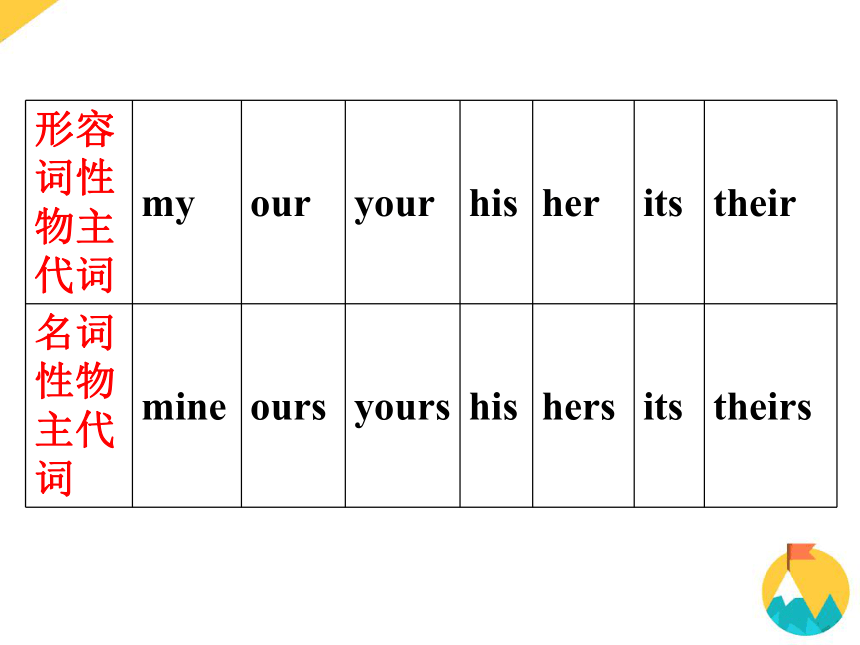
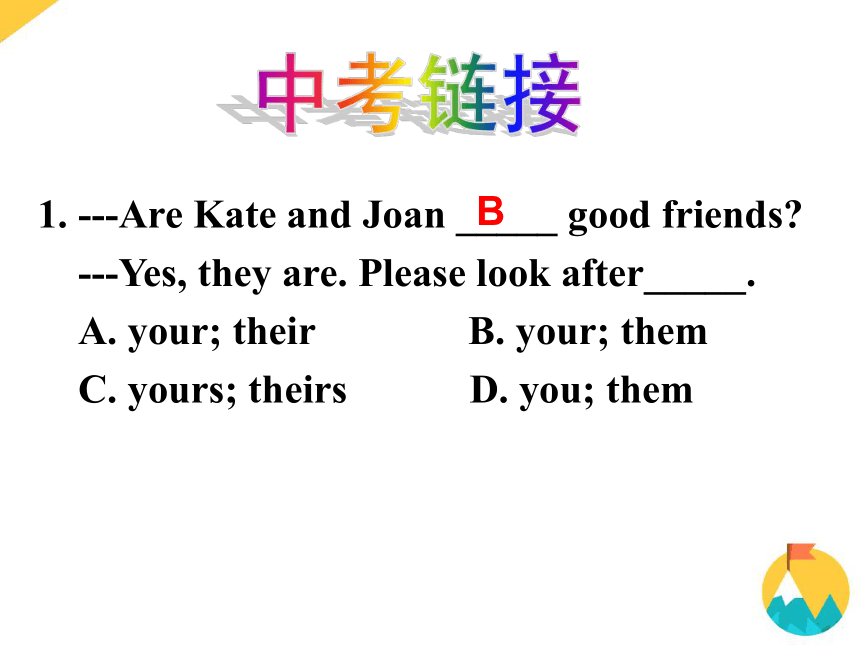
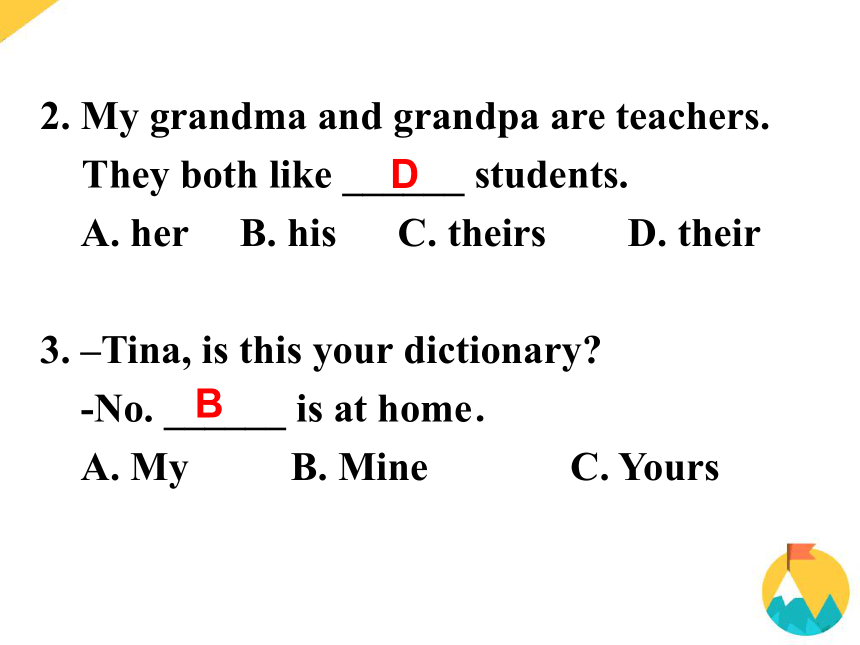
文档简介
(共44张PPT)
1. 分析近三年对于代词的考查, 其中对人称代词、物主代词及反身代词的考查尤为突出。?其中题干以对话形式为主,词数在10到18词之间,考生应识记并灵活运用第一、二、三人称的各种变换形式。?
2. 同时, 对于不定代词的考查也不容忽视,考生应熟练掌握neither,?either,?both及something,?anything,?everything,?nothing等的用法。
人称代词指代人或物,分为主格和宾格。主格在句中充当主语;宾格在句中充当动词的宾语或表语、介词的宾语。
考点一:人称代词
/ 第一人称 第二人称 第三人称
单数 复数 单数 复数 单数 复数
主格 I we you you he she it they
宾格 me us you you him her it them
it的用法
1) 可代替前面提到过的事物,也可代替可数名词单数或不可数名词。
e.g. This is a watch. It is new.
2) 指时间、天气、距离等。
e.g. — How’s the weather today?
— It’s sunny.
It’s eight o’clock in the evening.
3) 可代替动词不定式作句中的形式主语或形式宾语,也可用于某些固定句式中。
It’s + adj. / n. (for sb./ of sb.) + to do sth.
(it作形式主语)
Sb. find(s) / think(s) it + adj. + to do sth.
(it作形式宾语)
e.g. It’s necessary for us to learn English
well.
?? ?She found it difficult to learn
geography.
1. Please?lend _______English?book?to _______.
?A. your, me? B. you, me? C. you, I
2. Tomorrow?is?our?teacher's?birthday?
and?we?are?going?to?give?_____?a?big?
surprise.
A. his? B. him? C. he ?D. himself
A
B
3. -Dave, where?is?Mr. Black??
-I?saw?____?in?the?classroom?ten?
minutes?ago.
? A. he B. him? C. she ?D. her
4. -Mike, who?helped?____ make?the?paper?
plane?
? -Nobody! I?made?it?all?by?myself.
? A. your? B. yours? C. you? D. yourself?
B
C
考点二:物主代词
物主代词用来表示所属关系,分为形容词性物主代词和名词性物主代词。
形容词性物主代词在句中作定语修饰名词,不能单独使用;
名词性物主代词相当于“形容词性物主代词+名词”,可与of所有格连用。
形容词性物主代词 my our your his her its their
名词性物主代词 mine ours yours his hers its theirs
1. ---Are?Kate?and?Joan _____ good?friends?
---Yes, they?are. Please?look?after_____. ??
? A. your; their? B. your; them?
C. yours; theirs? D. you; them
B
2. My?grandma?and?grandpa?are?teachers. They?both?like ______ students.
A. her B. his? C. theirs ?D. their
3. –Tina, is?this?your?dictionary?
?-No. ______ is?at?home. ??
A. My? B. Mine? C. Yours?
D
B
4. –David, is?that?______?English?dictionary?
?-Yes, it?is?_______. It?is?new.
A. yours; my? B. your; my? C. your; mine
5. She?is?my?friend. _______name?is?Betty.
A. Its? B. His? C. Her? D. My?
C
C
考点三:反身代词
1.?反身代词表示“某人自己的”,在句中可用作动词或介词的宾语,也可用作主语或宾语的同位语,表示强调。
? 单数 复数
第一人称 myself ourselves
第二人称 yourself yourselves
第三人称 himself themselves
herself
itself
2.?反身代词的固定搭配有:
by oneself (独自), for oneself (为自己), enjoy oneself (过得愉快), help yourself / yourselves to sth. (随便吃), teach oneself (自学), dress oneself (给自己穿衣服), believe in oneself (相信自己), behave oneself (举止规矩), keep it to oneself (不把某事告诉别人), talk to oneself (自言自语), say to oneself (心里想)等。
1. ---Do?you?know?who?taught _____ French?
---Nobody. He?learned?it?by ____.
A. his; himself? B. him; him?
C. him; himself? D. his; him?
C
2.?On?the?way?to?Mount?Heng,?the?scenery?
was?so?beautiful?that?all?of?us?lost?______?
in?it.?
A.?myself??????B.?themselves??????C.?ourselves
3.?If?we?just?think?about?_______,?the?boat?of friendship?will?be?overturned?anytime.?
A.?myself???????? B.?himself????????
C.?yourself???????? D.?ourselves?
C
D
4. —What?a?nice?model?plane!?
—Thanks.?I?made?it?with?3-D?printer?
by?_____.?
A.?me????B.?him????C.?itself?????D.?myself?
5.?My?cousin?Andrew?is?crazy?about?doing?
many?things?by?_____.?
A.?herself?????????? B.?himself??????
C.?him??????????? D.?her?
D
B
考点四:指示代词
常用的指示代词有this,that,these和
those。
\ 单数 复数
指近 this这;这个 these?这些
指远 that?那;那个 those?那些
温馨提示:
1. that和those可用于比较结构来替代前面提到的名词,以避免重复。
2.?打电话时用this介绍自己,用that询问对方。
1.?—The?population?of?China?is?larger?
than?______?of?India.?
—Yes,?but?India’s?population?is?
increasing?rapidly.?
A.?it?????? B.?one????? C.?that???? ??D.?this
C
2. —Who is that speaking?
—_____ Mike speaking.
A. I'm B. My name is
C. That is D. This is
3. Your home town is really nice! The air quality is as good as _____ of Sanya.
A. it B. one C. that D. the one
D
C
考点五:不定代词
常用的不定代词有:some, any, one, no, both, neither, none, all, each, either, many, much, few, little, a few, a little, other, the other, others, the others, another以及由every, some, any, no构成的复合不定代词,如something, everything, nothing, anybody, somebody, nobody, everyone, someone等。
辨析常用不定代词
both, all, neither, none, either, any
1. both, all都表示肯定意义。both表示“两者都”;all表示“三者或三者以上都”。
2. neither, none都表示否定意义。neither表示“两者都不”,与both相对;none表示“三者或三者以上都不”,与all相对。
3. either表示“两者中任何一个”;any表示“(三者或三者以上中的)任何的,任一的”。
another, the other, others, the others
1. another指不确定数目中的“另一个”,后接单数名词、“of +复数名词”或“数字+复数名词”。
2. the other?特指两部分或两者中的另外一个,常与one?连用。
3. others相当于“other +可数名词复数”,表示不确定指,相当于汉语的“其他的人或物,别的人或物”。
4. the others表示确定指,相当于汉语的“其余的人或物,所有其他的人或物”。
复合不定代词
thing 复合不定代词 含义 用法 例句
something 某事;某物 常用于肯定句中 You can eat something first.
thing 复合不定代词 含义 用法 例句
anything 某事;某物 常用于否定句及疑问句中 I didn’t eat anything for lunch.
Did you eat anything for lunch?
任何东西(事物) 常用于肯定句中 You can take anything you like.
thing 复合不定代词 含义 用法 例句
everything 一切 用于肯定句、否定句及疑问句中 Her son is everything to her.
Money isn’t everything.
How is everything?
thing 复合不定代词 含义 用法 例句
nothing 没有什么 用于否定句中,相当于not anything I have nothing to say now. = I don’t have anything to say now.
one
? 复合不定代词 含义 用法 例句
someone 某人 常用于肯定句中 I saw someone in that room.
anyone 某人 常用于否定句及疑问句中 I didn’t see anyone in the room.
Did anyone call me yesterday?
任何人 常用于肯定句中 Anyone can do that.
one 复合不定代词 含义 用法 例句
everyone 人人;大家 用于肯定句、否定句及疑问句中 Everyone is here today.
Everyone doesn’t like the food here.
Did everyone in your class go for a trip?
no one 没有人 常用于否定句中 No one wants to walk to the zoo.
注意:
1.?复合不定代词作主语时,谓语动词常用单数形式。
e.g. Everyone in this village is friendly.
2.?复合不定代词若有定语修饰时,定语要放在其后。
e.g. Let’s do something interesting.
He wants something to eat now.
3. something?也可用于期望得到对方肯定回答的疑问句中。
e.g. Would you like something to drink?
1. -There?is?no?salt?left. Jim, would?you?
like?to?get?________?
-OK, Mum!
A. it? B. one? C. some? D. any
2. I'm?sorry?I?know______?about?it. It's?a?secret?between?them.
A. nothing? B. something?
C. anything? D. everything?
C
A
3. -Is?there ________?else?in?the?classroom??
-It?is?empty. _____ is?listening?to?a?
speech?in?the?school?hall.
A. anyone; Anyone?
B. anyone; Everyone?
C. everyone; Anyone?
D. everyone; Everyone
B
4. ---There’re?four?bedrooms?in?the?house
_______with?its?own?shower.?
---That’s?what?I?want. I’ve?got?a?few?
kids.
A. either B. neither?
C. each? D. none
5. --Who?was?hurt?in?the?traffic?accident??
--_______.
A. None? B. No?one? C. Nothing?
C
B
6. -Is?there?______in?today’s?newspaper?
?-No, I?think?everything?in?it?is?boring.
A. interesting?anything?
B. somebody?interesting?
C. interesting?something?
D. anything?interesting
D
7. -Where?would?you?like?to?go?for?your?
summer?holiday, Beijing?or?Shanghai?
-_______. I?will?go?to?Sanya?in?Haina
A. Both? B. Each? C. Neither? D. Either
8. -Which?of?the?two?T-shirts?would?you?
like?to?choose?
? -Both. Then?I?can?give?one?to?my?brother?
and?leave?____?to?myself.
? A. another? B. the?other ?C. other
C
B
考点六:疑问代词
常用的疑问代词有who, whom, whose, what和which。疑问代词引导的问句为特殊疑问句,它们通常位于疑问句的句首。
温馨提示:
who通常对表示人的主语、宾语、表语提问,whom对表示人的宾语提问。
疑问代词 主要用法 例句
who
谁 作主语、表语、宾语。 Who wants to play with me?
whom
谁 who的宾格形式,作宾语。 Whom are you waiting for?
whose
谁的 who的所有格形式,作表语、定语。 Whose scarf is this?
疑问代词 主要用法 例句
what
什么 在不确定范围内选择,用what,意为“什么”,作主语、宾语和定语。 What would you like to eat?
which
哪个 在明确的、已知的范围内选择,用which,意为“哪一个;哪一些”,作主语、宾语和定语。 Which season do you like best?
1. —?______?do?you?usually?share?happiness?
with???
—?My?parents?and?my?best?friend.??
A.?Who? B.?Whose? C.?What? D.?How?
A
2. —I've found a wallet at the gate.
_____ is it?
—Oh, it's mine.
A. Where B. What C. Whose
3. —_____ will you ask for help when you
get into trouble?
—My parents, I think.
A. Who B. What C. Where
C
A
4. —_____ is your favorite day?
—Monday. Because we have P.E. and music.
A. Why B. Who
C. How D. What
D
1. 分析近三年对于代词的考查, 其中对人称代词、物主代词及反身代词的考查尤为突出。?其中题干以对话形式为主,词数在10到18词之间,考生应识记并灵活运用第一、二、三人称的各种变换形式。?
2. 同时, 对于不定代词的考查也不容忽视,考生应熟练掌握neither,?either,?both及something,?anything,?everything,?nothing等的用法。
人称代词指代人或物,分为主格和宾格。主格在句中充当主语;宾格在句中充当动词的宾语或表语、介词的宾语。
考点一:人称代词
/ 第一人称 第二人称 第三人称
单数 复数 单数 复数 单数 复数
主格 I we you you he she it they
宾格 me us you you him her it them
it的用法
1) 可代替前面提到过的事物,也可代替可数名词单数或不可数名词。
e.g. This is a watch. It is new.
2) 指时间、天气、距离等。
e.g. — How’s the weather today?
— It’s sunny.
It’s eight o’clock in the evening.
3) 可代替动词不定式作句中的形式主语或形式宾语,也可用于某些固定句式中。
It’s + adj. / n. (for sb./ of sb.) + to do sth.
(it作形式主语)
Sb. find(s) / think(s) it + adj. + to do sth.
(it作形式宾语)
e.g. It’s necessary for us to learn English
well.
?? ?She found it difficult to learn
geography.
1. Please?lend _______English?book?to _______.
?A. your, me? B. you, me? C. you, I
2. Tomorrow?is?our?teacher's?birthday?
and?we?are?going?to?give?_____?a?big?
surprise.
A. his? B. him? C. he ?D. himself
A
B
3. -Dave, where?is?Mr. Black??
-I?saw?____?in?the?classroom?ten?
minutes?ago.
? A. he B. him? C. she ?D. her
4. -Mike, who?helped?____ make?the?paper?
plane?
? -Nobody! I?made?it?all?by?myself.
? A. your? B. yours? C. you? D. yourself?
B
C
考点二:物主代词
物主代词用来表示所属关系,分为形容词性物主代词和名词性物主代词。
形容词性物主代词在句中作定语修饰名词,不能单独使用;
名词性物主代词相当于“形容词性物主代词+名词”,可与of所有格连用。
形容词性物主代词 my our your his her its their
名词性物主代词 mine ours yours his hers its theirs
1. ---Are?Kate?and?Joan _____ good?friends?
---Yes, they?are. Please?look?after_____. ??
? A. your; their? B. your; them?
C. yours; theirs? D. you; them
B
2. My?grandma?and?grandpa?are?teachers. They?both?like ______ students.
A. her B. his? C. theirs ?D. their
3. –Tina, is?this?your?dictionary?
?-No. ______ is?at?home. ??
A. My? B. Mine? C. Yours?
D
B
4. –David, is?that?______?English?dictionary?
?-Yes, it?is?_______. It?is?new.
A. yours; my? B. your; my? C. your; mine
5. She?is?my?friend. _______name?is?Betty.
A. Its? B. His? C. Her? D. My?
C
C
考点三:反身代词
1.?反身代词表示“某人自己的”,在句中可用作动词或介词的宾语,也可用作主语或宾语的同位语,表示强调。
? 单数 复数
第一人称 myself ourselves
第二人称 yourself yourselves
第三人称 himself themselves
herself
itself
2.?反身代词的固定搭配有:
by oneself (独自), for oneself (为自己), enjoy oneself (过得愉快), help yourself / yourselves to sth. (随便吃), teach oneself (自学), dress oneself (给自己穿衣服), believe in oneself (相信自己), behave oneself (举止规矩), keep it to oneself (不把某事告诉别人), talk to oneself (自言自语), say to oneself (心里想)等。
1. ---Do?you?know?who?taught _____ French?
---Nobody. He?learned?it?by ____.
A. his; himself? B. him; him?
C. him; himself? D. his; him?
C
2.?On?the?way?to?Mount?Heng,?the?scenery?
was?so?beautiful?that?all?of?us?lost?______?
in?it.?
A.?myself??????B.?themselves??????C.?ourselves
3.?If?we?just?think?about?_______,?the?boat?of friendship?will?be?overturned?anytime.?
A.?myself???????? B.?himself????????
C.?yourself???????? D.?ourselves?
C
D
4. —What?a?nice?model?plane!?
—Thanks.?I?made?it?with?3-D?printer?
by?_____.?
A.?me????B.?him????C.?itself?????D.?myself?
5.?My?cousin?Andrew?is?crazy?about?doing?
many?things?by?_____.?
A.?herself?????????? B.?himself??????
C.?him??????????? D.?her?
D
B
考点四:指示代词
常用的指示代词有this,that,these和
those。
\ 单数 复数
指近 this这;这个 these?这些
指远 that?那;那个 those?那些
温馨提示:
1. that和those可用于比较结构来替代前面提到的名词,以避免重复。
2.?打电话时用this介绍自己,用that询问对方。
1.?—The?population?of?China?is?larger?
than?______?of?India.?
—Yes,?but?India’s?population?is?
increasing?rapidly.?
A.?it?????? B.?one????? C.?that???? ??D.?this
C
2. —Who is that speaking?
—_____ Mike speaking.
A. I'm B. My name is
C. That is D. This is
3. Your home town is really nice! The air quality is as good as _____ of Sanya.
A. it B. one C. that D. the one
D
C
考点五:不定代词
常用的不定代词有:some, any, one, no, both, neither, none, all, each, either, many, much, few, little, a few, a little, other, the other, others, the others, another以及由every, some, any, no构成的复合不定代词,如something, everything, nothing, anybody, somebody, nobody, everyone, someone等。
辨析常用不定代词
both, all, neither, none, either, any
1. both, all都表示肯定意义。both表示“两者都”;all表示“三者或三者以上都”。
2. neither, none都表示否定意义。neither表示“两者都不”,与both相对;none表示“三者或三者以上都不”,与all相对。
3. either表示“两者中任何一个”;any表示“(三者或三者以上中的)任何的,任一的”。
another, the other, others, the others
1. another指不确定数目中的“另一个”,后接单数名词、“of +复数名词”或“数字+复数名词”。
2. the other?特指两部分或两者中的另外一个,常与one?连用。
3. others相当于“other +可数名词复数”,表示不确定指,相当于汉语的“其他的人或物,别的人或物”。
4. the others表示确定指,相当于汉语的“其余的人或物,所有其他的人或物”。
复合不定代词
thing 复合不定代词 含义 用法 例句
something 某事;某物 常用于肯定句中 You can eat something first.
thing 复合不定代词 含义 用法 例句
anything 某事;某物 常用于否定句及疑问句中 I didn’t eat anything for lunch.
Did you eat anything for lunch?
任何东西(事物) 常用于肯定句中 You can take anything you like.
thing 复合不定代词 含义 用法 例句
everything 一切 用于肯定句、否定句及疑问句中 Her son is everything to her.
Money isn’t everything.
How is everything?
thing 复合不定代词 含义 用法 例句
nothing 没有什么 用于否定句中,相当于not anything I have nothing to say now. = I don’t have anything to say now.
one
? 复合不定代词 含义 用法 例句
someone 某人 常用于肯定句中 I saw someone in that room.
anyone 某人 常用于否定句及疑问句中 I didn’t see anyone in the room.
Did anyone call me yesterday?
任何人 常用于肯定句中 Anyone can do that.
one 复合不定代词 含义 用法 例句
everyone 人人;大家 用于肯定句、否定句及疑问句中 Everyone is here today.
Everyone doesn’t like the food here.
Did everyone in your class go for a trip?
no one 没有人 常用于否定句中 No one wants to walk to the zoo.
注意:
1.?复合不定代词作主语时,谓语动词常用单数形式。
e.g. Everyone in this village is friendly.
2.?复合不定代词若有定语修饰时,定语要放在其后。
e.g. Let’s do something interesting.
He wants something to eat now.
3. something?也可用于期望得到对方肯定回答的疑问句中。
e.g. Would you like something to drink?
1. -There?is?no?salt?left. Jim, would?you?
like?to?get?________?
-OK, Mum!
A. it? B. one? C. some? D. any
2. I'm?sorry?I?know______?about?it. It's?a?secret?between?them.
A. nothing? B. something?
C. anything? D. everything?
C
A
3. -Is?there ________?else?in?the?classroom??
-It?is?empty. _____ is?listening?to?a?
speech?in?the?school?hall.
A. anyone; Anyone?
B. anyone; Everyone?
C. everyone; Anyone?
D. everyone; Everyone
B
4. ---There’re?four?bedrooms?in?the?house
_______with?its?own?shower.?
---That’s?what?I?want. I’ve?got?a?few?
kids.
A. either B. neither?
C. each? D. none
5. --Who?was?hurt?in?the?traffic?accident??
--_______.
A. None? B. No?one? C. Nothing?
C
B
6. -Is?there?______in?today’s?newspaper?
?-No, I?think?everything?in?it?is?boring.
A. interesting?anything?
B. somebody?interesting?
C. interesting?something?
D. anything?interesting
D
7. -Where?would?you?like?to?go?for?your?
summer?holiday, Beijing?or?Shanghai?
-_______. I?will?go?to?Sanya?in?Haina
A. Both? B. Each? C. Neither? D. Either
8. -Which?of?the?two?T-shirts?would?you?
like?to?choose?
? -Both. Then?I?can?give?one?to?my?brother?
and?leave?____?to?myself.
? A. another? B. the?other ?C. other
C
B
考点六:疑问代词
常用的疑问代词有who, whom, whose, what和which。疑问代词引导的问句为特殊疑问句,它们通常位于疑问句的句首。
温馨提示:
who通常对表示人的主语、宾语、表语提问,whom对表示人的宾语提问。
疑问代词 主要用法 例句
who
谁 作主语、表语、宾语。 Who wants to play with me?
whom
谁 who的宾格形式,作宾语。 Whom are you waiting for?
whose
谁的 who的所有格形式,作表语、定语。 Whose scarf is this?
疑问代词 主要用法 例句
what
什么 在不确定范围内选择,用what,意为“什么”,作主语、宾语和定语。 What would you like to eat?
which
哪个 在明确的、已知的范围内选择,用which,意为“哪一个;哪一些”,作主语、宾语和定语。 Which season do you like best?
1. —?______?do?you?usually?share?happiness?
with???
—?My?parents?and?my?best?friend.??
A.?Who? B.?Whose? C.?What? D.?How?
A
2. —I've found a wallet at the gate.
_____ is it?
—Oh, it's mine.
A. Where B. What C. Whose
3. —_____ will you ask for help when you
get into trouble?
—My parents, I think.
A. Who B. What C. Where
C
A
4. —_____ is your favorite day?
—Monday. Because we have P.E. and music.
A. Why B. Who
C. How D. What
D
同课章节目录
- 词法
- 名词
- 动词和动词短语
- 动词语态
- 动词时态
- 助动词和情态动词
- 非谓语动词
- 冠词
- 代词
- 数词和量词
- 形容词副词及其比较等级
- 介词和介词短语
- 连词和感叹词
- 构词法
- 相似、相近词比较
- 句法
- 陈述句
- 一般疑问句和否定疑问句
- 特殊疑问句及选择疑问句
- 反意疑问句
- 存在句(There be句型)
- 宾语从句
- 定语从句
- 状语从句
- 主谓一致问题
- 简单句
- 并列句
- 复合句
- 主谓一致
- 主、表语从句
- 名词性从句
- 直接引语和间接引语
- 虚拟语气
- 感叹句
- 强调句
- 倒装句
- 祈使句
- 句子的成分
- 句子的分类
- 题型专区
- 单项选择部分
- 易错题
- 完形填空
- 阅读理解
- 词汇练习
- 听说训练
- 句型转换
- 补全对话
- 短文改错
- 翻译
- 书面表达
- 任务型阅读
- 语法填空
- 其他资料
